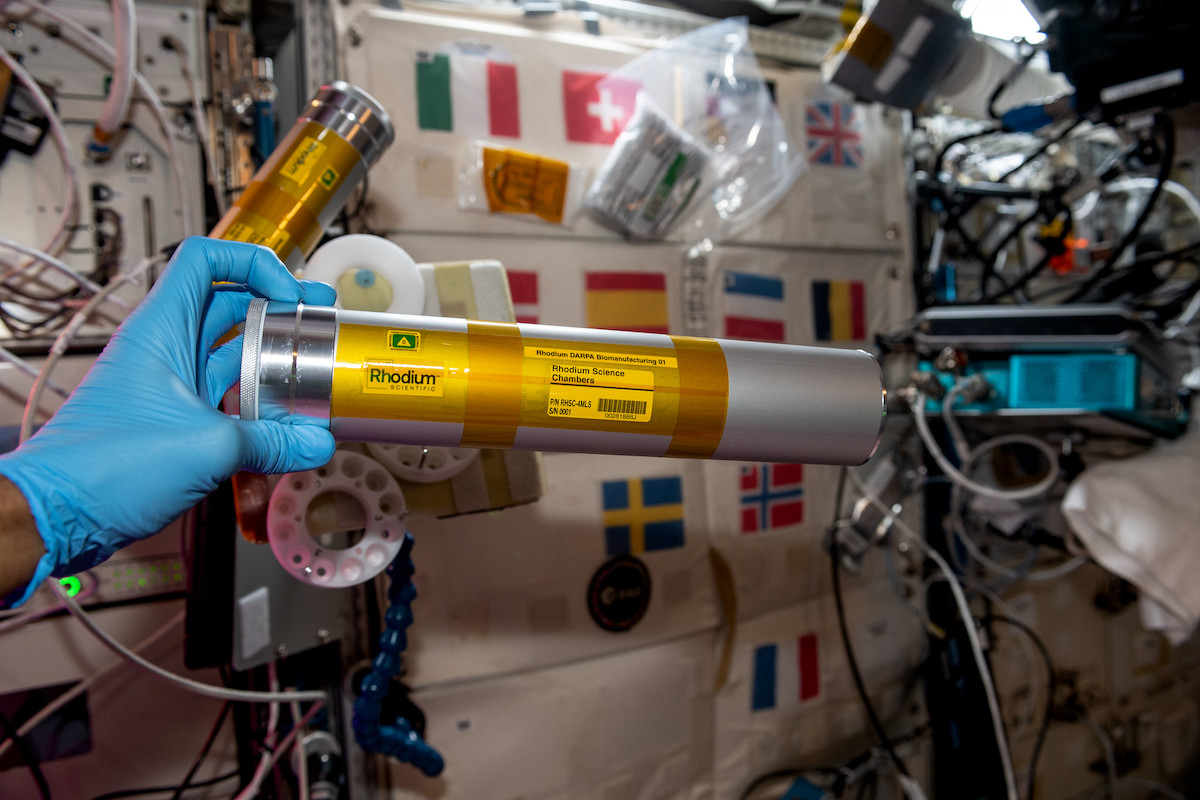Channels
Special Offers & Promotions
Rhodium Scientific to Test the Concept of Biomanufacturing in Space

When you pack for an extended trip, you usually bring everything you will need while you are away—food, clothing, medication, and other necessities. But what do you do if your trip takes you to space, where cargo room is extremely limited and expensive? A team of researchers from Rhodium Scientific and the University of Florida propose that you pack some useful microbes along with your essentials. These microbes could help make other products you might need during your stay.
To test the concept of biomanufacturing in space, the research team is leveraging the International Space Station (ISS) National Laboratory. The project, which is supported by the Defense Advanced Research Projects Agency (DARPA), launched on SpaceX’s 27th Commercial Resupply Services (CRS) mission and is now being carried out by ISS crew members. As part of DARPA’s Biomanufacturing: Survival, Utility, and Reliability beyond Earth (B-SURE) program, the investigation will examine how gravity affects the production of therapeutics and nutrients from bacteria and yeast.
“It’s an exciting mission because we will advance the concept of biomanufacturing in space,” said Olivia Gamez Holzhaus, CEO at Rhodium Scientific, an ISS National Lab Commercial Service Provider. “We want to see if industrial microorganisms that produce products on Earth will still produce those products in space, and if the products produced will be superior to their terrestrial counterparts.”
Microgravity induces changes in microorganisms, including alterations in cellular growth, structure, and metabolic activity, which can affect the biomanufacturing process. As part of this investigation, Rhodium Scientific developed a spaceflight-certified centrifuge that simulates Martian and lunar gravity on the space station to test how effective the microbes work in three different gravities.
According to Gamez Holzhaus, the team sent microbes that are known to make PHB (polyhydroxybutyrate), a type of bio-derived and biodegradable plastic that is used for 3D printing stock, and vitamin A (beta carotene). Once the microbes are activated on the ISS, they will be allowed to grow for specific amounts of time before the vials are frozen and sent back to Earth for analysis.
“It’s expensive to send things to space, so if we can find a way to put our vitamin- or plastic-making microbes in vials and transport them to the space station or even to the Moon or Mars and activate them when we need it, this could really be beneficial for future long-duration and deep space missions,” Gamez Holzhaus said.
But the benefits go beyond deep space, says Gamez Holzhaus, and could enhance the global supply chain. “If we could produce vitamins and minerals, like beta carotene, from a vial instead of mass-producing carrots, we could reduce our agricultural footprint,” she said. “So, it really could enhance the supply chain, and it's very sustainable.”
SpaceX CRS-27 launched to the International Space Station on March 14 at 8:30 p.m. EDT. This mission included more than 15 ISS National Lab-sponsored payloads. To learn more about all ISS National Lab-sponsored research on this mission, please visit our launch page.?
About the International Space Station (ISS) National Laboratory
The International Space Station (ISS) is a one-of-a-kind laboratory that enables research and technology development not possible on Earth. As a public service enterprise, the ISS National Lab allows researchers to leverage this multiuser facility to improve life on Earth, mature space-based business models, advance science literacy in the future workforce, and expand a sustainable and scalable market in low Earth orbit. Through this orbiting national laboratory, research resources on the ISS are available to support non-NASA science, technology and education initiatives from U.S. government agencies, academic institutions, and the private sector. The Center for the Advancement of Science in Space, Inc. (CASIS) manages the ISS National Lab, under Cooperative Agreement with NASA, facilitating access to its permanent microgravity research environment, a powerful vantage point in low Earth orbit, and the extreme and varied conditions of space.
Media Partners


